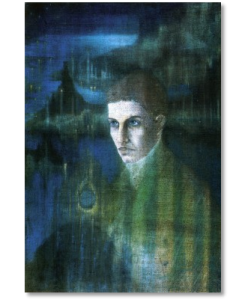The Rijksmuseum has acquired the  pastel Henri van Booven as a Young Priest. The 1900-’01 pastel by Carel de Nerée is seen as one of the masterpieces of Dutch symbolist art. It stems from the collection Gerard van Wezel and in the article dedicated to the acquisiton of a considerable part of his fabulous collection of symbolist art in the latest latest Rijksmuseum Bulletin Aleid Ottevanger writes:
pastel Henri van Booven as a Young Priest. The 1900-’01 pastel by Carel de Nerée is seen as one of the masterpieces of Dutch symbolist art. It stems from the collection Gerard van Wezel and in the article dedicated to the acquisiton of a considerable part of his fabulous collection of symbolist art in the latest latest Rijksmuseum Bulletin Aleid Ottevanger writes:
‘The blue-green pastel on canvas Henri van Booven as a Young Priest which is dated to around 1900-’01 is a pinnacle in this idealistic drive to express ideas and imagination. Originally influenced by Jan Toorop, Karel de Nerée tot Babberich (1880-1909) found an entirely individual form of dreamy symbolism in this idealized portrait of his friend, the writer Henri van Booven, which was highly praised at that time. During his diplomatic career – first in The Hague and later in Madrid – De Nerée tot Babberich soon emerged as a draughts-man with a talent for sophisticated images of the decadent life that was becoming increasingly popular in literature.’
With the risk of sounding wronged and cynical, it is a little alienating to have to correct this entry on several points, as I supplied the Rijks with everything I know about this work when they invited me for a cup of decadent coffee last year, when word came out that they were about to acquire it. It could be just a minor detail though that in 2014-’15 I curated an exhibition were the portrait was the centre piece and wrote a book about the friendship of De Nerée and Van Booven. It is not mentioned in the article but one could have read there, and in several other (online) places, that this pastel could never have been an immediate succes as De Nerée never exhibited during his life time and seem to only have sold one or two works. This pastel certainly wasn’t one of them as, for example, not even its sitter knew where it was for almost ten years after it was finished. In 1910 he, and everyone else, could admire it at the first posthumous De Nerée exhibitions.
And I personally would not say that he soon emerged as a draughtsman as virtually nobody, I wrote about this in detail, knew anything about his art during his lifetime. And he did not have a diplomatic career, although he certainly wished he had but due to his sickness and proper schooling this never materialized. See this site and my book for more details about all this and more.
Lastly: after 1900 decadent literature wasn’t becoming popular but was as dead as a doornail by that time.
But maybe I am just being too scientific and all nitpicking asides anyways, it is phenomenal that this masterpiece is now in a public collection and will hopefully be on view for everyone!
And please excuse me for now, as I have to get back to writing my full-fledged biography of this most fascinating artist.
